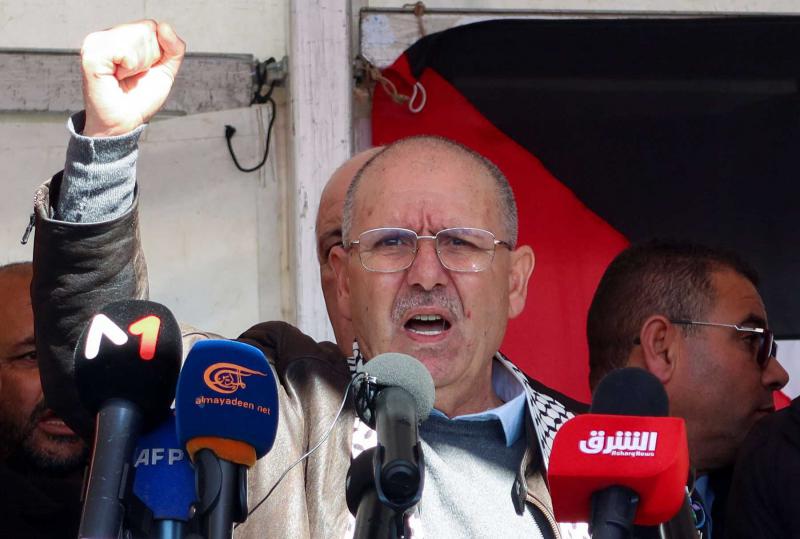Thousands of Tunisians protested deteriorating living standards outside the prime minister’s office following a call from the trade union.
Sunday 03/03/2024
TUNIS –
Secretary-General of the Tunisian General Labour Union (UGTT), Noureddine Taboubi said on Saturday that the government had refused to implement the agreements signed with UGTT, welcoming the decision of President Kais Saied to put an end to precarious work and all forms of subcontracting labour.
Taking the floor during a gathering held outside the Prime Ministry at the Kasbah square, Taboubi said that “the social dialogue with the government has been blocked.”
The government has not activated the agreement of February 6, 2021 which includes 46 sectoral agreements, claiming that “it is dealing with public finance difficulties.”
“The government claims to have paid off its debts last year, yet this was done at this expense of basic foodstuffs which were missing on the national market and were not imported in sufficient quantities,” he explained.
Taboubi added that the agreement which was signed with the government on salary increase has not been implemented, despite the deterioration of the purchasing power of workers and the high inflation rate (7.3 percent in January 2024)
On the other hand, he reiterated that “since the Tunisian Revolution, the UGTT has fought against all forms of precarious work which resulted in sorting out the situation of construction site workers, teachers and substitute teachers.”
Taboubi called for cancelling Decree 54 in order to guarantee freedom of expression and freedom of opinion as well as resume negotiations which represent a major step forward to building Tunisia.
Thousands of Tunisians protested deteriorating living standards outside the prime minister’s office following a call from the trade union.
“The economic and social situation continues to worsen,” Taboubi, said in a speech to protesters.
Taboubi said the state’s ability to service its foreign debt in 2023 had been “to the detriment of the people and resulted in shortages of basic products.”
He criticised the implementation of “diktats from the International Monetary Fund” (IMF) at the expense of ordinary Tunisians.
Next March 9 and 10, the UGTT will form an administrative committee which will examine the general situation in the country and monitor the cases of trade unionists prosecuted in Tunisian courts.
Tunisian researcher in political science Mohamed Larbi Ayari, said that the leadership of the General Labour Union “is moving to invest in the political situation,” and it is not unlikely that the union has understood that “a political front that opposes Saied’s tendencies has begun to form,” so the union is seeking to be part of it.
Ayari continued in a statement to The Arab Weekly, “The union is not betting on its own weight as much as it is betting on developments on the political arena, and is now appearing at the Kasbah square to say that it is capable of reversing the trend.”
The Tunisian economy is at a standstill with growth of 0.4 percent and an unemployment rate of 16.4 percent in 2023, according to the National Institute of Statistics.
Unemployment stood at 15.2 percent at the end of 2022.
President Kais Saied has ruled by decree since a July 2021 power grab and last year rammed through a constitution that gave his office unlimited powers and neutered parliament.
Weathering a grave economic crisis, Tunis concluded an agreement with the IMF in October 2022 for a two billion dollar loan facility.
But loan tranches stalled when the president rejected reforms demanded by the IMF.

